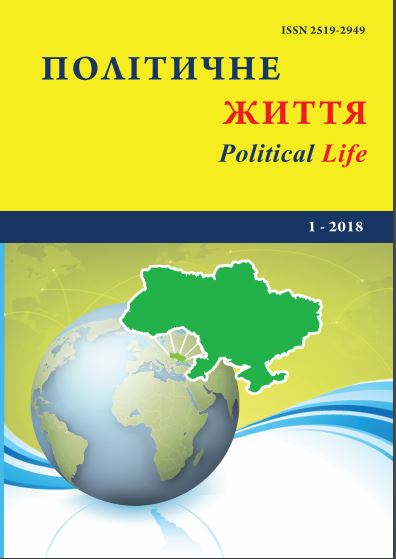Informal subversive institutionalization as a characteristic of Ukrainian politics.
DOI:
https://doi.org/10.31558/2519-2949.2018.1.9Keywords:
Ukraina, informal institutions, informal subversive institutionalization, corruption, nepotism, clientism, clanismAbstract
The article studies the evolution and forms of the destructive type of informal institutions in Ukraine. It proves that at different development stages of independent Ukraine the informal political institutional space played a decisive role in shaping the political landscape and states that the significant influence of informal political institutions on the Ukrainian politics led to the emergence of institutional defects in the political governance infrastructure of the country. The author analyzes the processes of client networks’ modification during the presidency of L. Kuchma, V. Yushchenko, V. Yanukovych, and expresses thoughts on the changes in the structure and intensity of informal politics in Ukraine after the Revolution of Dignity. The study investigates the peculiarities of the existing state-political order in Ukraine, which is determined by institutional characteristics such as clientism, clanism, cronyism, patronage relations etc. It defines the main manifestations of nepotism, cronyism etc. in the Ukrainian politics and the main factors, which allow the activity of informal subversive institutions in Ukraine. They include: lack of constructed, institutionally developed state architecture; chaotic processes of political institutionalization; the political system not being focused on the production of public goods, but on the practices of rent-seeking and “state capture”; propensity of the governing elite to solve issues using the informal institutions and practices; insignificant level of control over the power reproduction processes by the Ukrainian society etc. The author hypothesized that the way out of the situation of informal destructive institutions’ dominance in the domestic politics lies in the sphere of political culture, namely in formation of a value-oriented outlook (axiosphere), which denies the acceptability of using the instruments of subversive institutionalization in building the statehood on the democratic basis.References
Грабіна Г. Політична еліта України як уособлення субкультури влади / Г. Грабіна // Грані. ‒ 2016. ‒ № 3 (131). ‒ С. 55‒61.
Діденко І. Непотизм, фаворитизм та кронізм як причини виникнення конфлікту інтересів / І. Діденко // Підприємництво господарство і право. ‒ 2017. ‒ № 8. ‒ С. 103‒106.
Дорош Л. Непотизм як політико-правова проблема українського державотворення / Л. Дорош, О. Івасечко // Humanitarian vision. ‒ 2015. ‒ Том 1. ‒ № 1. ‒ С. 13‒20.
Інституційні зміни політичної системи сучасної України: оцінка стану та напрями оптимізації: аналітична доповідь / за ред. Г. Зеленько. ‒ К. : ІПіЕНД ім. І. Ф. Кураса НАН України, 2014. ‒ 164 с.
Кліпкова Г. О. Дієспроможність державних інститутів: пострадянський аспект : автореф. дис. канд. політ. н. : спец. 23.00.02 «Політичні інститути та процеси» / Ганна Олексіївна Кліпкова. ‒ Х. : Харк. нац. ун-т ім. В. Н. Каразіна, 2016. ‒ 18 с.
Кривошеїн В. Вплив «Революції гідності» на політичну та правову культуру українського суспільства / В. Кривошеїн // Вісник Національного університету «Юридична академія України імені Ярослава Мудрого». ‒ 2016. ‒ № 2 (29). ‒ С. 37‒58.
Крисенко О. Вплив неформальних інститутів на український політичний процес / О. Крисенко // Стратегічні пріоритети. ‒ 2012. ‒ № 4 (25). ‒ C. 58‒62.
Лаф Дж., Солоненко І. Чи здатна Україна на прорив у реформах? [Електронний ресурс]. ‒ Режим доступу: https://www.chathamhouse.org/sites/files/chathamhouse/publications/ research/2016-04-05-ukraine-reformbreakthrough-lough-sononenko-ukrainian-final.pdf
Мацієвський Ю. У пастці гібридності: зиґзаґи трансформацій політичного режиму в Україні (1991‒2014) / Ю. Мацієвський. ‒ Чернівці : Книги-XXI, 2016. ‒ 552 с.
Олійник О. Фаворитизм і кронізм як основні критерії кадрового добору політико-управлінської еліти в Україні / О. Олійник // Віче. ‒ 2014. ‒ № 20. ‒ С. 2‒5.
Рибій О. Характеристика депутатського складу Верховної Ради України I-VII скликань / О. Рибій // Маґістеріум. Сер. «Політичні студії». ‒ 2014. ‒ № 58. ‒ С. 39‒44.
Розумний М. Виклики національного самовизначення / М. Розумний. ‒ К. : Національний інститут стратегічних досліджень, 2016. ‒ 196 с.
Сарбаш К. Специфіка гібридного політичного режиму: трансформаційні процеси в сучасній Україні / К. Сарбаш // Гілея. ‒ 2014. ‒ № 85. ‒ С. 310‒314.
Сахань О. (2016). Непотизм як деструктивна складова сучасної політичної культури України / О. Сахань // Вісн. Нац. ун-ту «Юридична академія України імені Ярослава Мудрого». ‒ 2016. ‒ № 2 (29). ‒ С. 286‒293.
Трачук В. Політична еліта та політична модернізація / В. Трачук // Українська національна ідея: реалії та перспективи розвитку. ‒ 2008. ‒ № 20. ‒ С. 139‒144.
Фісун О. Неформальні інститути та неопатримоніальна демократія в Україні / О. Фісун // Агора. ‒ 2016. ‒ № 17. ‒ С. 12‒13.
Comparing crony capitalism around the world. The Economist’s crony-capitalism index. [Електронний ресурс]. ‒ Режим доступу: https://www.economist.com/blogs/graphicdetail/2016/ 05/daily-chart-2
Way L. Rapacious Individualism and Political Competition in Ukraine, 1992–2004 / L. Way // Communist and Post-Communist Studies. ‒ 2005. ‒ Vol. 38. ‒ Iss. 2. ‒ P. 191‒205.

